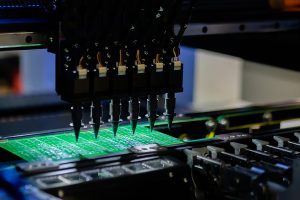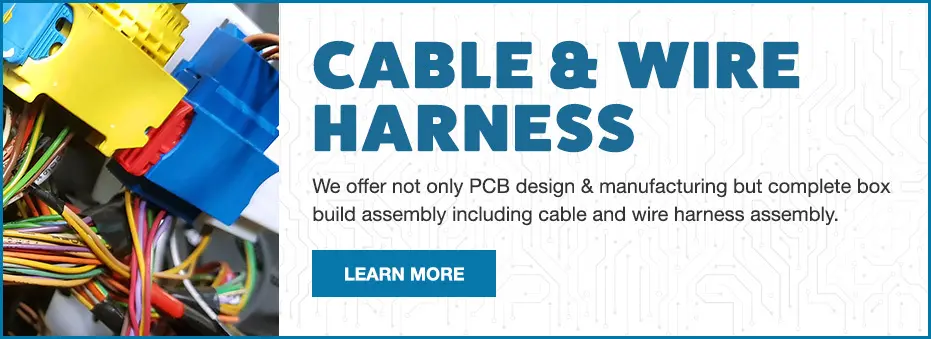Ensuring Quality in Box Builds, Wire Harnesses, and Cable Assemblies
When outsourcing your electronic manufacturing—whether it’s PCB assembly, cable assemblies, or final enclosures—quality is, of course, a top priority. The ECM you choose to bring your design to life must meet regulatory standards to ensure your end product is not only functional but also durable and compliant with your industry’s requirements. While much attention goes into PCB assembly and internal components, the final stages—such as box builds, wire harnesses, and cable assemblies—are equally vital.

Challenges in Box Builds, Wire Harness, and Cable Assemblies
Manufacturing box builds, wire harnesses, and cable assemblies presents several challenges that can jeopardize quality outcomes. One of the biggest issues stems from the increasing complexity of modern designs—particularly the trend toward miniaturization. As devices shrink in size but require more connections, the use of smaller connectors and thinner wires introduces greater potential for errors.
These compact builds demand high precision, and even minor mistakes can cause serious operational problems. Beyond design complexity, material selection and environmental factors also play a critical role. Devices that rely on these assemblies are often exposed to harsh conditions like extreme temperatures, moisture, or chemical exposure. While box builds and assemblies are intended to protect internal components, they can also introduce additional quality risks if not properly engineered and assembled.

Design for Manufacturability (DFM) Can Help Address Quality Concerns
The best way to ensure quality in box builds, wire harnesses, and cable assemblies is to look at all potential concerns at the very beginning of the process. When suspected challenges are addressed during the design phase, things like size, materials, operating environment, and number of connections can be planned for. This order of operations allows for necessary adjustments before the manufacturing process begins.
After putting the device through a DFM analysis prior to PCB manufacturing, a working prototype can be developed and tested to determine where any issues that will affect quality are. Using a working model allows the development team and manufacturing team to come together to find the best design to incorporate all the necessary components.
What Should Be Included in Quality Control Processes?
There are several key elements that can ensure quality throughout the manufacturing process for box builds, cable assemblies, and wire harnesses.
-
A Formal, Documented Process
Many ECMs use the standard of ISO 9001 to document their quality control processes. This process should be transparent to all clients.
-
Standardized Documentation
If every stage of a project, or even every unique project, has its own individual documentation procedure, it can be difficult to make sure that the right measures are being taken. Every customer is unique with certain specified needs for their devices, but the documentation process should be something that is easily duplicated and referenced.
-
Vetted Suppliers for Materials
All materials and components should come from trusted and vetted suppliers, which will greatly reduce the possibility of counterfeit or substandard components.
-
Regular Maintenance and Calibration of Equipment
All settings should be calibrated and established at the beginning of the process, and regular inspections should be scheduled to ensure all the technology involved in the process is working up to standard.
-
A Documented and Rigorous Testing Phase
This includes both final testing as well as functionality and quality checks during the manufacturing process.
Thorough Testing Procedures Ensure Reliability and Functionality
All electronic assemblies go through thorough testing at various stages throughout the manufacturing process. The more advanced and rigorous the testing process, the better to prove the device will be able to hold up to a variety of uses and operating environments. Advanced testing, such as continuity testing, hi-pot testing, and resistance testing will help ensure the reliability, particularly of wire harnesses, and make sure that all the connections are secure and functional.
Quality Control Processes
The primary reason to put a device through quality control processes is to ensure compliance, functionality, reliability, and durability in the operating environment. However, when an ECM has these quality control processes and procedures in place, they serve a second benefit: ensuring that all customer specifications are fulfilled. While some clients are flexible with their requirements as long as the final device is of high-quality and performs as expected, others, whether due to industry regulations or company preferences, are more stringent in how the device is designed and manufactured. By putting quality assurance practices in place throughout the process, but particularly at the cable assembly, wire harness, or box build stage of manufacturing, all the customer specifications can be accounted for as well as ensuring the final enclosure is sound.
Quality control processes that focus on the box build, cable assemblies, and wire harnesses are just as important as those that go into the PCB manufacturing process. The entire process, from the initial design to the final enclosure, should meet all the customer specifications, industry standards, and regulatory requirements. When you are choosing an ECM for your electronic manufacturing needs, look for a partner who is able to demonstrate their commitment to quality throughout the full process.
Choose Levison
We understand that quality isn’t just about what’s inside your device—it’s about every component and connection that brings it together. From design for manufacturability (DFM) to rigorous testing and documentation, we prioritize quality control at every stage of production, including box builds, wire harnesses, and cable assemblies.
With vetted suppliers, calibrated equipment, and a formalized quality process, we ensure your end product performs reliably in real-world conditions. When precision matters and compliance can’t be compromised, Levison Enterprises is the ECM partner you can count on to deliver manufacturing excellence from the inside out. Contact us today for a quote on your next build.
Start Your Quote Now!